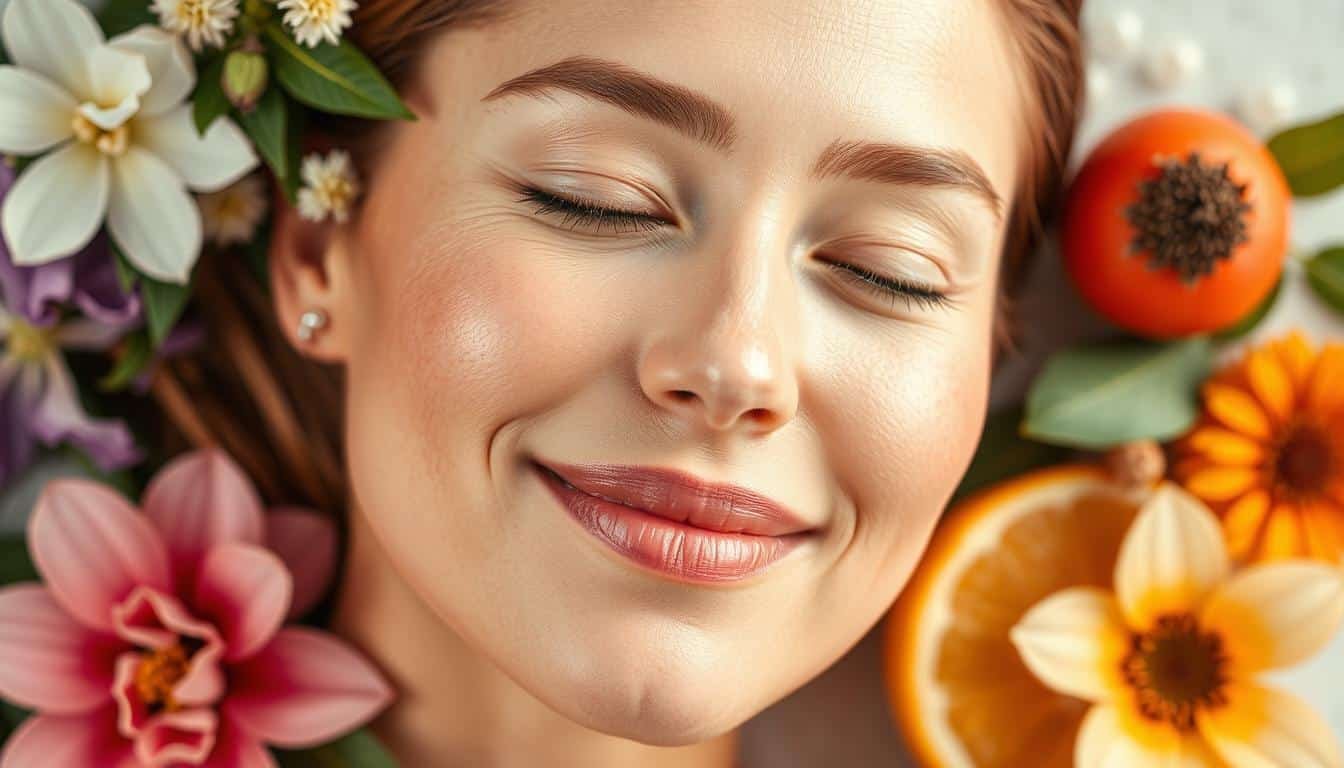Healthy, glowing skin shows true beauty. The skin is our body’s biggest organ, protecting us from the outside world. It has many layers, like the epidermis, dermis, and subcutaneous tissue, each with special jobs.
The top layer, the epidermis, keeps moisture in and out. Below it, the dermis has blood vessels, nerve endings, and glands that make sweat and sebum. The deepest layer, the subcutaneous tissue, has fat cells that keep us warm and cushioned.
Many things affect how our skin looks and stays healthy, like our genes, age, and lifestyle. For glowing skin, we need to look at both what’s inside and outside of us. Knowing how the skin works helps us find the best way to keep it looking young and bright.
Key Takeaways
- The skin is the body’s largest organ, consisting of multiple layers with distinct structures and functions.
- Healthy, glowing skin requires a multifaceted approach that addresses both internal and external factors.
- Understanding the skin’s anatomy and the elements that influence its health is crucial for developing an effective skincare routine.
- Achieving a radiant complexion involves a combination of proper skincare, a balanced diet, and healthy lifestyle habits.
- Protecting the skin from environmental stressors and maintaining a strong barrier function are key to maintaining a youthful, glowing appearance.
Understanding Glowing Skin
Glowing skin means your skin looks healthy, smooth, and radiant. This natural shine shows your skin is in good health. But remember, perfect skin doesn’t exist. Everyone has normal skin traits like pores, fine lines, and blemishes.
What is Glowing Skin?
The skin is our body’s biggest organ. It protects us from harm. The epidermis, the top layer, has special skin cells like melanocytes and Langerhans cells that help keep skin looking good. The dermis, the middle layer, has blood vessels, collagen, and skin appendages like hair follicles and sweat glands that also help with glowing skin.
Factors Influencing Skin Health
Many things can affect skin health and how it looks. These include your genes, hormones, health, medicines, the environment, and your lifestyle. While some things you can’t change, there are many ways to help your skin stay healthy and glow.
| Factors Affecting Skin Health | Examples |
|---|---|
| Genetics | Skin type, pigmentation, susceptibility to conditions |
| Hormones | Hormonal changes during puberty, pregnancy, or menopause |
| Health Conditions | Acne, eczema, psoriasis, rosacea |
| Medications | Certain prescription drugs, over-the-counter products |
| Environmental Factors | Sun exposure, air pollution, harsh weather conditions |
| Lifestyle Behaviors | Diet, sleep, stress levels, skincare routine |
Skin Care Routine for Glowing Skin

Getting a radiant, glowing complexion is easy with a simple skincare routine. Focus on cleansing, moisturizing, and protecting your skin from the sun. This approach helps keep your skin healthy and vibrant.
Cleansing
Choosing a gentle, pH-balanced cleanser is key for cleansing. Avoid harsh chemicals or soap. Clean your skin in the morning, before bed, and after sweating. This removes dirt, oil, and impurities that can clog pores and dull your skin.
Moisturizing
Using a good moisturizer right after cleansing locks in moisture. If you have oily skin, go for an oil-free formula. Dry skin types might need a richer moisturizer. Proper moisturizing keeps your skin supple and strengthens its protective barrier.
Don’t forget about sunscreen. Choose a broad-spectrum SPF 30 or higher. Apply it on all exposed skin. UV rays can cause sun damage and premature aging, so protecting your skin is crucial for a youthful look.
Adding a gentle exfoliant or shaving with the right technique can also enhance your skin’s glow. But be careful, especially if you have darker skin tones, to avoid irritation or razor burn.
By following these essential skin care steps daily, you can bring out your skin’s natural glow.
Skin

Nutrition for Glowing Skin
Eating a balanced diet full of vitamins, minerals, and healthy fats can make a big difference in our skin’s health and look. Some nutrients are key for keeping the skin strong, safe from harm, and looking bright.
Vitamin A is vital for skin cell growth and health. It helps keep the epidermis and dermis in good shape. It also fights aging signs and may protect against skin cancer. Vitamin B2 helps make collagen, which keeps skin firm and young. Vitamin B6 prevents skin problems like rashes and cracks.
Vitamin C is a strong antioxidant that supports the skin’s barrier and boosts collagen. It also protects against UV rays. Vitamin D aids in healing wounds and reducing swelling, important for a glowing skin. Vitamin E protects the skin from sun damage and environmental harm.
Also, omega-3 fatty acids and zinc are key for skin health. Omega-3s lessen inflammation and enhance the skin’s moisture barrier. Zinc supports the immune system and helps make collagen and melanin.
By eating foods rich in nutrients like fruits, veggies, whole grains, lean meats, and healthy fats, you can feed your skin from within. This can help you get a bright, youthful look.
Lifestyle Habits for Glowing Skin

Getting glowing skin is more than just about a good skincare routine. Lifestyle choices also play a big role in keeping the skin, our body’s biggest organ, healthy and looking good dermis also contains together to form composed of collagen vessels in the dermis provide beneath the dermis.
Quitting smoking is key. Smoking speeds up skin aging, slows down wound healing, and raises the risk of skin cancer. Smokers often see more wrinkles and a dull, uneven skin tone.
Reducing stress helps the skin too. Try yoga, meditation, or fun activities to relax. Too much stress can cause inflammation, making skin conditions worse.
Getting 7-9 hours of sleep each night is vital. It lets the body fix and strengthen the skin. Good sleep keeps the skin’s structure and function right evaporation loose connective tissue anatomical basal cells soles of the feet cells are found superficial keratin skin also cutaneous receptor also contains .
Drinking lots of water and not too much alcohol is key. Alcohol can lead to skin problems like redness, dryness, and inflammation.
Regular exercise boosts overall health and may slow down skin aging. By making these lifestyle changes, you can enhance your skincare routine and get a glowing complexion.
Also Read : Skin Fitness: Maximizing The Benefits Of Exercise For Your Skincare
Conclusion
The skin is an amazing organ that keeps us healthy and looking good. It has three main layers: the epidermis, dermis, and subcutaneous. These layers protect us by keeping moisture in and temperature steady.
They also have cells, blood vessels, and nerve endings that keep the skin working right. To get glowing skin, we need to take care of it from the inside and outside. This means using skincare products, eating well, and living a healthy life.
Things like stress, sleep, and drinking water are key to keeping the skin looking young. If you want to improve your skin, talking to a dermatologist can help. They can give you advice and treatments for your skin issues.
By using skincare tips and living well, you can get skin that looks healthy and bright. This makes you feel more confident and full of life.
FAQs
Q: What is the structure and function of human skin?
A: Human skin consists of multiple layers, including the epidermis, dermis, and hypodermis. The epidermis contains the outermost layer, the stratum corneum, which serves as a protective barrier. The dermis, which is the thickest skin layer, contains blood vessels, lymphatic vessels, and nerve endings, contributing to its structure and function.
Q: How does the skin play a vital role in protecting the body?
A: The skin acts as a protective integument by serving as a barrier against environmental hazards, pathogens, and physical injuries. It also helps in regulating body temperature and conserving moisture through its layers of skin.
Q: What is the role of sebaceous glands in maintaining healthy skin?
A: Sebaceous glands are responsible for secreting sebum, an oily substance that keeps the skin moisturized and helps prevent dryness. This secretion plays a crucial role in maintaining the skin’s health and appearance.
Q: How can I improve blood flow to the skin for a glowing complexion?
A: Improving blood flow to the skin can be achieved through regular exercise, staying hydrated, and using skincare products that stimulate circulation. Techniques such as facial massages can also enhance blood flow to the skin surface.
Q: What are the different layers of the skin, and what do they contain?
A: The skin consists of three main layers: the epidermis, dermis, and hypodermis. The epidermis contains epidermal cells that protect against external factors, while the dermis houses blood vessels, lymphatic vessels, and connective tissue. The hypodermis, or subcutaneous fat layer, provides insulation and cushioning.
Q: How does skin tension affect the appearance of the skin?
A: Skin tension affects the skin’s appearance by influencing its firmness and elasticity. When skin is well-hydrated and has good blood flow, it can maintain adequate tension, leading to a healthier and more glowing complexion.
Q: What factors can disrupt the balance of the skin surface?
A: Factors such as environmental stressors, poor diet, hormonal changes, and inadequate hydration can disrupt the balance of the skin surface and lead to issues like dryness, irritation, or acne.
Q: Why is it important to care for the skin on the palms and soles?
A: The skin on the palms and soles is thicker and more resilient but also requires care to prevent cracking and dryness. Regular moisturizing and exfoliating can help maintain the health of these areas, which are prone to wear and tear.
Q: How do lymphatic vessels contribute to skin health?
A: Lymphatic vessels play a crucial role in skin health by draining excess fluid and waste products from the skin. This helps maintain proper skin hydration and supports immune functions within the dermis.
Source Links
- https://www.medicalnewstoday.com/articles/how-to-get-glowing-skin
- https://www.mayoclinic.org/healthy-lifestyle/adult-health/in-depth/skin-care/art-20048237
- https://www.isdin.com/en-US/blog/all/6-tips-for-healthy-skin-this-summer/




